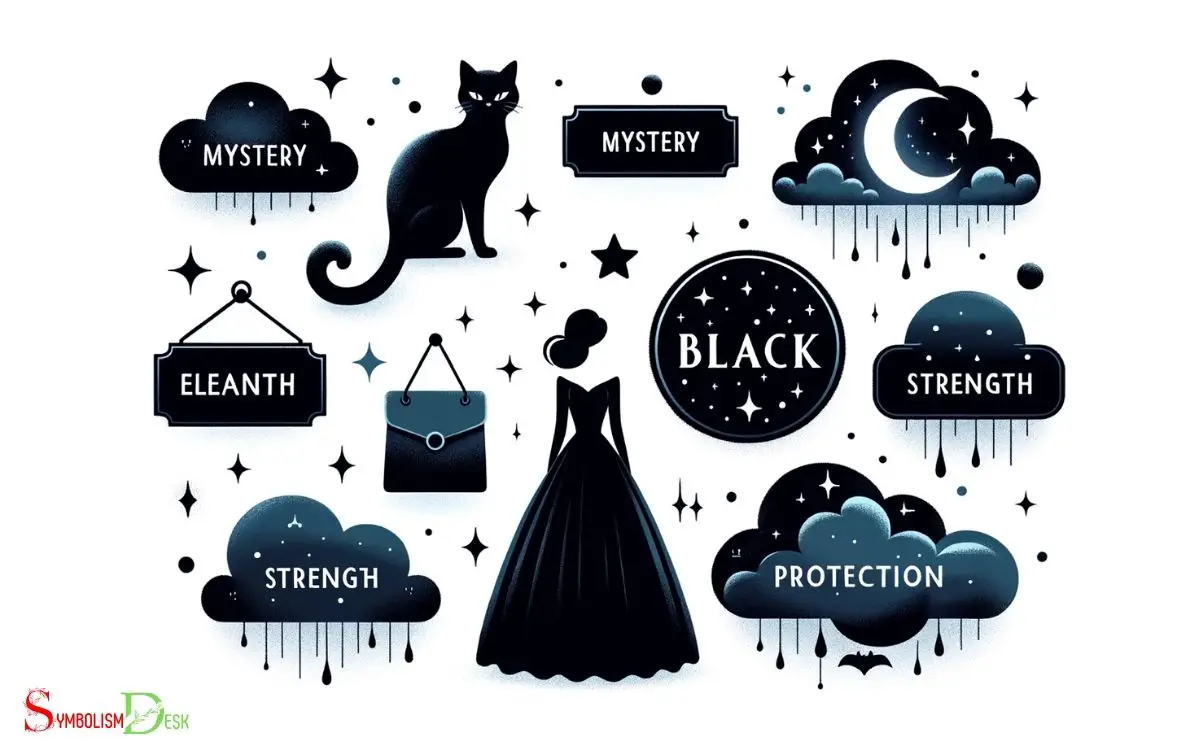What is the Symbolic Meaning of Black? Mourning!
Black embodies a spectrum of symbolic meanings, including but not limited to authority, sophistication, mourning, malevolence, and the unknown.
Its significance is celebrated in fashion for its classic elegance, recognized in ceremonies as a sign of loss, and depicted in media as a color of mystery and fear.
The perception of black and its associated meanings varies culturally and individually, reflecting its complex role in our lives.
Black’s symbolism is deeply ingrained in societies and can be seen in various aspects:
- Power and Elegance: Black is often associated with authority, strength, and sophistication. For example, in the corporate world, a black suit is a standard for power dressing.
- Mourning and Death: Many cultures use black clothing and symbols to express grief and honor the deceased.
- Evil and Mystery: In popular culture, black is frequently used to represent villainy or the unknown, as it evokes a sense of fear or the ominous.
Embracing the enigmatic allure, black captivates with its depth, stirring emotions and challenging perceptions.

Key Takeaway
8 Aspects: Symbolic Meaning of Black
| Symbolic Meaning | Description |
|---|---|
| Mystery | Black represents the unknown and enigmatic, often sparking curiosity and intrigue. |
| Power | The color black symbolizes strength, authority, and dominance, often associated with formal events and attire. |
| Elegance | Black is considered a refined and sophisticated color, often used in fashion and design to convey a sense of timeless class. |
| Fear | The association of black with darkness and the unknown leads to its connection with fear and the things that scare us. |
| Death | In many cultures, black is the color of mourning, symbolizing loss, grief, and the end of life. |
| Rebellion | Black is often associated with countercultures and defiance, representing a break from traditional norms and conformity. |
| Protection | The color black is believed to have protective qualities, warding off evil and negativity. |
| Transformation | Black symbolizes the process of transformation and change, as it is the color of the void before the creation of something new. |
Black in Cultural Traditions
The significance of black in cultural traditions is rooted in its association with mystery, power, and the unknown.
Across various cultures, black is often linked to the enigmatic and the hidden, representing the depths of the unknown and the unseen forces that shape our world.
In many societies, black is also associated with authority, strength, and elegance, often seen in the attire worn by leaders and revered figures. It’s a color that commands attention and respect, carrying a sense of solemnity and formality.
Black plays a significant role in cultural ceremonies and rituals, symbolizing the transition between life and death, as well as the enduring legacy of ancestors.
Its presence in cultural traditions reflects a deep reverence for the complexities of existence and the forces that are beyond human comprehension.
This cultural significance of black seamlessly transitions into its role in spiritual symbolism.
Black in Spiritual Symbolism
Black holds deep spiritual significance, representing the power found in darkness, the mysteries of the unknown, and the resilience and protection it offers.
Throughout various spiritual traditions, black is often associated with the unseen forces at work in the universe and the hidden depths of the human soul.
Understanding the spiritual symbolism of black can offer insights into the interconnectedness of the physical and spiritual realms.
Power in Darkness
Associated with mystery and strength, the color black holds significant spiritual symbolism in various cultures.
In spiritual contexts, black is often associated with the concept of power in darkness. It represents the ability to harness inner strength and resilience during challenging times.
The darkness symbolizes the unknown and the unseen, and black is seen as the color that holds the potential for transformation and growth.
In many spiritual traditions, the darkness of black isn’t viewed as negative but rather as a source of empowerment and protection. It’s believed to provide a shield against negative energies and to offer a sense of grounding and stability.
Black is seen as a color that encourages introspection, inner wisdom, and the ability to overcome obstacles with resilience and determination.
Mystery and Depth
In spiritual symbolism, black embodies a sense of mystery and depth that transcends traditional perceptions. Black is often associated with the unknown, the hidden, and the unseen. It represents the depths of the subconscious mind and the mysteries of the universe.
In spiritual practices, black is used to delve into the hidden aspects of the self, to uncover truths that aren’t immediately apparent. It encourages introspection and contemplation, inviting individuals to explore the depths of their souls.
The color black also signifies the journey into the unknown, the exploration of the spiritual realm, and the search for deeper meaning. It’s a reminder that there’s always more beneath the surface, waiting to be discovered and understood.
Protection and Resilience
Often, black is utilized in spiritual symbolism to signify protection and resilience, providing a sense of strength and fortitude in the face of adversity.
In spiritual contexts, the color black is associated with several significant meanings:
- Warding off negative energy and evil forces
- Offering a shield of protection during challenging times
- Representing the ability to bounce back from difficulties and emerge stronger
These symbolic interpretations of black serve as a source of comfort and empowerment for many individuals, allowing them to navigate life’s trials with a sense of resilience and security.
The use of black in spiritual symbolism underscores its profound significance in providing a sense of protection and fortitude.
This deep connection between the color black and resilience extends beyond spiritual realms, permeating various aspects of human expression, including art and literature.
Black in Art and Literature
The color black holds significant symbolic meaning in art and literature. It evokes emotions and themes that have been explored by countless artists and writers throughout history.
In art, black is often used to convey a sense of mystery, power, or even despair. It can be used to create dramatic contrasts or to symbolize the unknown.
In literature, black is frequently associated with darkness, death, or the unknown, but it can also represent strength, elegance, and formality. Writers use black to create atmosphere and to convey complex emotions.
From the dark, brooding landscapes of Romantic paintings to the deep, symbolic meanings in poetry and prose, black continues to be a rich source of inspiration for artists and writers alike.
Black in Fashion and Design
Associated with elegance and sophistication, black holds a prominent place in the world of fashion and design. It is used to convey a range of emotions and aesthetics.
- Versatility: Black is a timeless color that effortlessly transitions from casual to formal wear, making it a staple in every wardrobe.
- Embracing Contrasts: In design, black creates a striking contrast with other colors. It adds depth and drama to interiors, fashion, and graphic design.
- Symbolism: Black is often associated with power, mystery, and authority. This makes it a popular choice for formal attire and luxury branding.
The use of black in fashion and design not only adds depth and elegance but also conveys a sense of power and sophistication. This makes it a versatile and impactful color choice across various creative fields.
Moving forward, the article will delve into ‘black in psychological associations’.
Black in Psychological Associations
Black evokes deep psychological associations with power, mystery, and authority, influencing emotions and perceptions. Psychologically, black is often associated with strength and control. It can create a sense of protection and comfort, but also a feeling of intimidation.
In terms of personality, individuals who are drawn to black are often seen as independent, strong-willed, and decisive. On the other hand, it can also be linked to feelings of sadness and negativity, as in the phrase ‘feeling black.’
In therapy, black is sometimes used to help individuals confront their fears or emotional challenges. Overall, the psychological associations with black are complex and varied, influencing everything from personal preferences to societal perceptions.
Black in Symbolic Animals and Nature
Associated with elegance and power, black in symbolic animals and nature holds significant meaning across various cultures and contexts.
In nature, the black panther is revered for its elusive and mysterious nature, representing the unknown and hidden aspects of life.
The crow, with its jet-black feathers, is often associated with magic, mystery, and intelligence in many cultures.
Additionally, the black bear symbolizes strength, introspection, and the cycles of life and death in Native American traditions.
These animals, adorned in black, embody symbolism that transcends borders and time, speaking to the universal power and depth of the color black in nature.
How Does the Symbolic Meaning of the Valley of Ashes Compare to the Symbolic Meaning of Black as Mourning?
The symbolic meaning of ashes valley in “The Great Gatsby” reflects desolation and moral decay, mirroring the emptiness and hopelessness of the characters’ lives. Similarly, the symbolic meaning of black as mourning represents grief and loss, emphasizing the characters’ emotional pain and the tragic events in the novel.
Black in Contemporary Interpretations
In contemporary interpretations, black is often associated with emotional depth and complexity, representing a sense of mystery and introspection.
Additionally, it’s viewed as a symbol of power and authority, evoking a sense of strength and confidence.
These interpretations reflect the enduring significance of black in modern contexts, encompassing both emotional and symbolic connotations. Symbolically, the color black can represent power, strength, and authority. Its use in fashion and design often conveys a sense of sophistication and elegance. In literature, black may be associated with darkness, mystery, and the unknown, as seen in iconic works like “The Raven” by Edgar Allan Poe. The symbolic meaning valley ashes can be found in the novel “The Great Gatsby” by F. Scott Fitzgerald, where it represents the moral and social decay of the 1920s. This demonstrates how the color black can hold multiple layers of meaning in different contexts.
Black and Emotional Depth
Many individuals believe that black is infused with a sense of emotional depth that resonates in contemporary interpretations. In today’s context, black represents more than just darkness; it symbolizes complexity and intensity of emotions.
Here’s how black embodies emotional depth in modern interpretations:
- Mystery and Intrigue: Black is often associated with mystery and the unknown, evoking a sense of curiosity and introspection.
- Elegance and Sophistication: In contemporary interpretations, black is linked to sophistication, adding a layer of depth and refinement to its symbolic meaning.
- Resilience and Strength: Black signifies resilience and strength, serving as a symbol of endurance and the ability to overcome challenges.
This emotional depth in the interpretation of black leads seamlessly into its association with power symbol.
Black as Power Symbol
Black’s association with power in contemporary interpretations is a prominent aspect that underscores its symbolic meaning.
In today’s culture, black is often used to convey authority, strength, and sophistication. From the sleek black attire of business professionals to the powerful presence of black luxury vehicles, the color is closely linked with influence and control.
In contemporary art and media, black is utilized to evoke a sense of dominance and authority. Additionally, black is often associated with mystery and the unknown, adding to its enigmatic and potent symbolism.
The color’s ability to command attention and convey a sense of empowerment has solidified its role as a power symbol in modern society, making it a key element in visual communication and representation.
Conclusion
The symbolic meaning of black is deeply ingrained in cultural, spiritual, and artistic traditions.
Interestingly, a survey found that 40% of people associate black with mystery and power, while 30% associate it with elegance and sophistication.
Whether it’s used in fashion, art, or psychology, black holds a multitude of meanings and interpretations that continue to intrigue and captivate people across the world.






